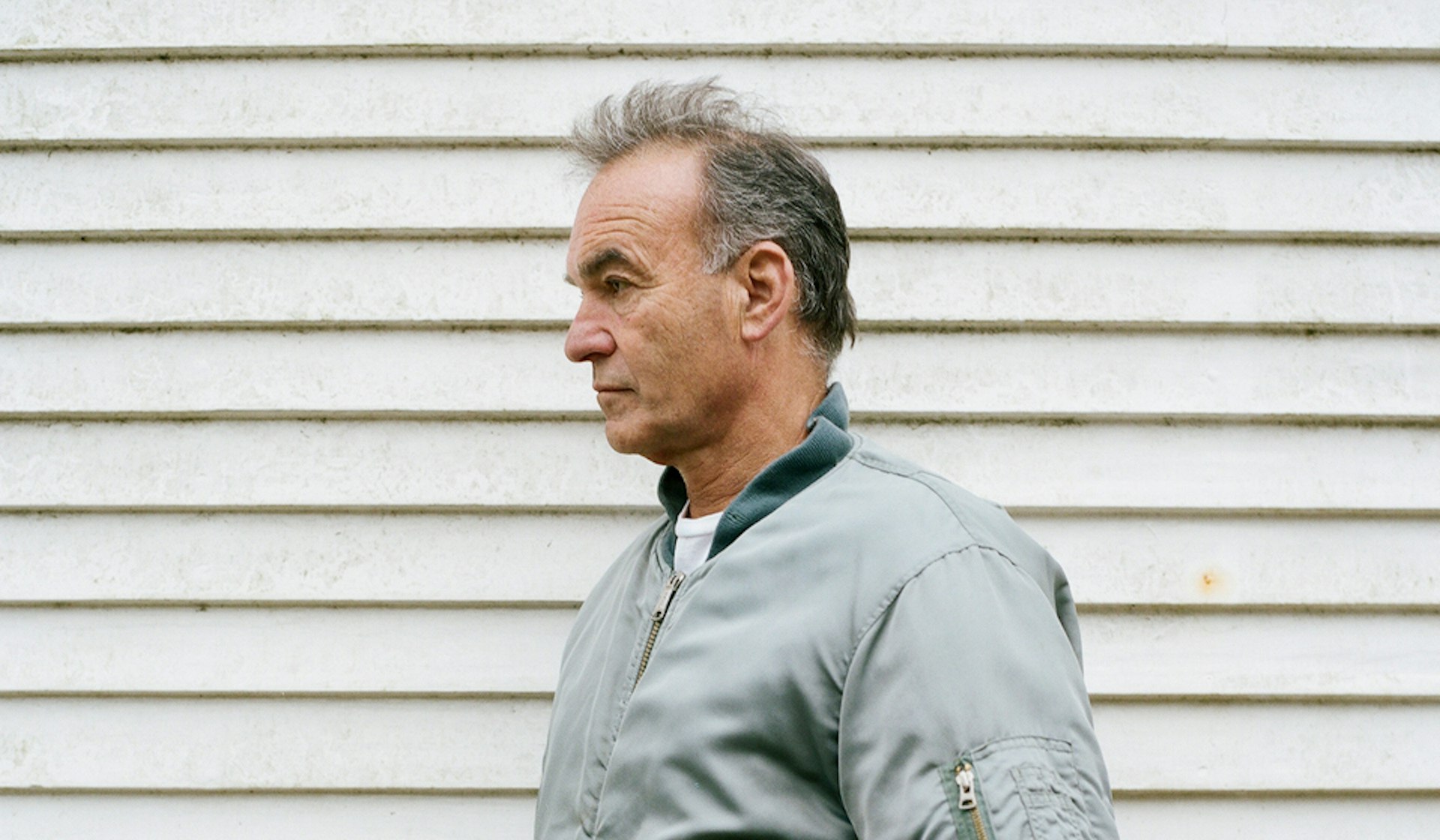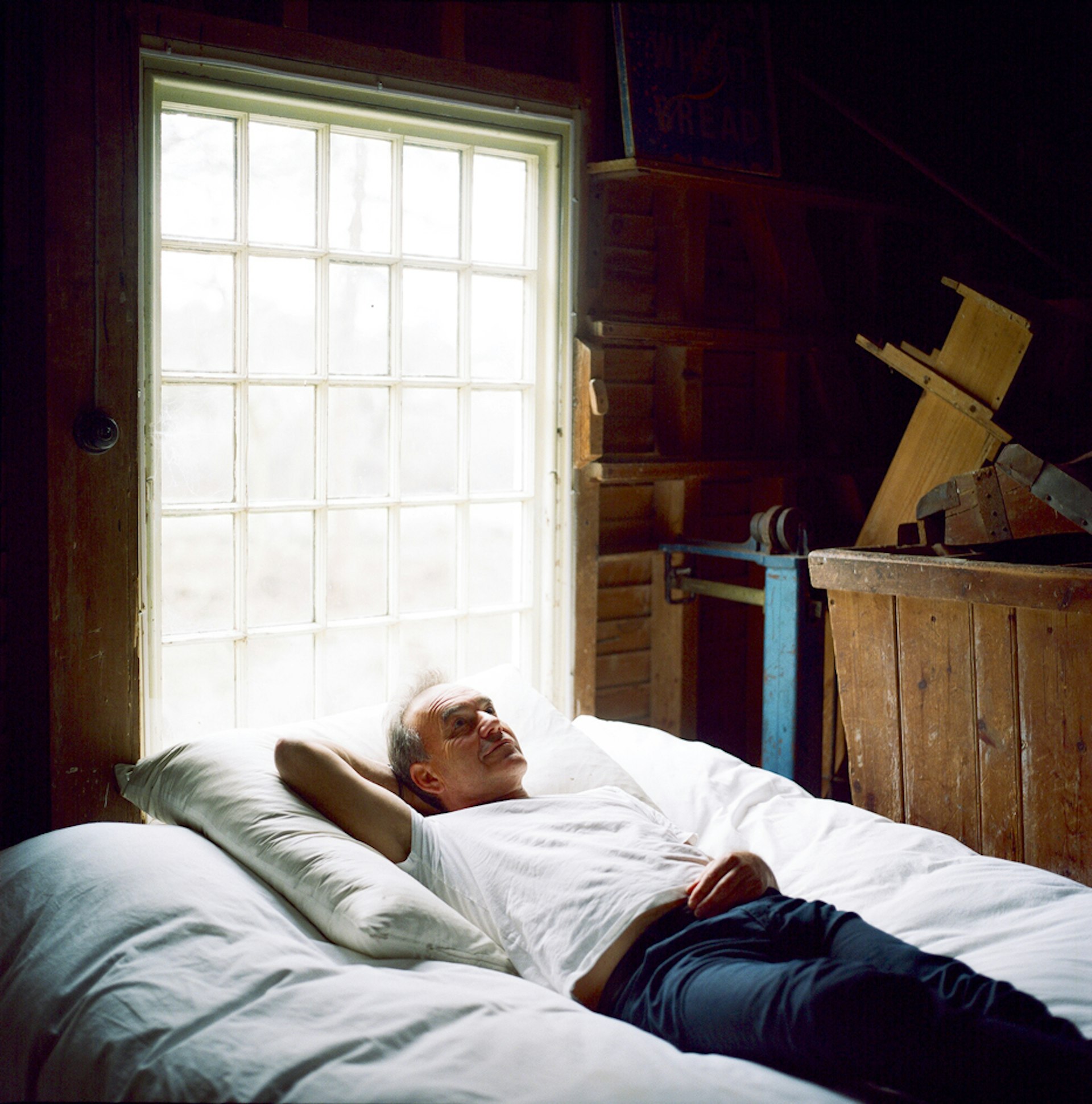
Nick Broomfield on the mistakes that made his career
- Text by Cian Traynor
- Photography by Lydia Goldblatt
Nick Broomfield has made a career out of turning setbacks into strengths. It started, he says, while filming a documentary on Lily Tomlin’s one-woman show The Search for Signs of Intelligent Life… in 1986.
The comedian restricted access, believing it would give too much away, and sued the production for millions.
“I was so frustrated,” he says. “We had all these great stories that we would tell our friends at dinner – and none of them were in the film. So on the next film I thought, ‘I’m gonna put it all in as an experiment.’”
That proved to be Driving Me Crazy: a documentary about an out-of-control musical that forced Broomfield to step in front of the camera, boom mic in hand, just to navigate the chaos.
It was the best thing that could have happened. He realised that traditional documentaries leave out a chunk of storytelling: the antics that go on behind the scenes.
Ever since, Broomfield has tackled sensational subjects in unconventional ways. Whether it’s investigating the lives of politicians (Sarah Palin: You Betcha!), criminals (Heidi Fleiss: Hollywood Madam) or celebrity deaths (Kurt and Courtney, Biggie and Tupac), the filmmaker champions warts’n’all subjectivity.
Often that means having no idea where a project will lead. His 1993 film on Aileen Wuornos (The Selling of a Serial Killer) – which came out 10 years before the blockbuster biopic, Monster – brought him so deep into her story that the pair became friends. She even asked him for an interview the day before being executed, leading to a follow-up documentary (Aileen: Life and Death of a Serial Killer) in 2003.
“That was such a devastating film that I stopped making documentaries for a while,” he says. “I had the job of asking her some difficult questions, to understand her, which was emotionally traumatising… I still can’t find ways to describe it.”
Today Broomfield is sitting on the red couch of a red hotel room in London, where he has spent the day promoting his new project Whitney: Can I Be Me, an unauthorised documentary about the life of Whitney Houston.
This is the day’s final interview and the 69-year-old – who splits his time between LA and Sussex – seems happy to sit back, coffee in hand, and reflect on his journey.
Dressed in a navy suit with an open white shirt, he speaks slowly and eloquently – readily admitting that he’s learned far more from his disasters than any moment of success. “It’s much easier to talk about the dogs than it is to name favourites because they’re all so different.”
What were your parents’ expectations of you?
Oddly, I think I did exactly what they expected. I was useless at school. I managed to scrape through university [studying political science at Essex University]. My father was a photographer who grew up in Derby and documented the industrial north.
My mother was a communist who was very politically engaged. So, in a way, I was a combination of them. My father probably thought my films were much too confrontational; I think they made him uneasy. They more reflected my mother: her assertiveness, her confrontational way of being.
I was very close to and fond of my uncle, Charles Lagus, who was David Attenborough’s first cameraman. I called him Uncle Chunk. Together they made Zoo Quest [a series of BBC nature documentaries]. They were in their twenties, heading off into the wild with rucksacks on their back, and nobody could keep tabs on them.
There were no telephones. The BBC would just ask, ‘Um, when will you be back?’ They got malaria, dysentery and were almost killed I don’t know how many times. I was very influenced by that.
My uncle would come back with all these weird animals, spears, shields, blowpipes and face masks. He had a Himalayan flying squirrel; he even brought back a bear! I thought, ‘This is the life.’ Film made school look rather boring.
As you’re piecing together a story, asking difficult questions, do you ever sense genuine regret among those you interview? I’d imagine it’s difficult for people to accept culpability on camera.
It’s not often that somebody is really interested in you and your opinion. So the role of a [documentary] filmmaker is a bit like a father confessor.
You’re not trying to diagnose them, like a psychiatrist, but you are listening. Posing questions they aren’t normally asked helps people reflect and sort their ideas out.
But there’s an intimacy to that process, a two-way relationship that often lasts far beyond the film. I was incredibly close to Ethel Singleton, who was in my very first film [1974’s Behind The Rent Strike], until she died in 2014.
For some of the participants, the stakes are so high – probably higher than they realise. When you’re making those reflective moments public, does it ever feel like a betrayal?
I think that happened a lot at the beginning of my career to devastating effect. One of the first projects I did after film school was called Juvenile Liaison, about a police scheme in Blackburn.
I was assigned to a guy called Sergeant Ray and another officer called Lillian Brooks. We followed them around as they worked with underprivileged families, young kids of seven and eight who had committed minor offences like stealing pencils – stuff that little kids do.
But the police tended to interrogate them like they were the great train robbers. They weren’t mean; just well-meaning people who hadn’t received appropriate training.
The film didn’t come out because the BFI banned it and it’s still banned today. But it got shown at the House of Commons and there was a parliamentary inquiry into the scheme. Those two officers, who had been so kind to us, were publicly ridiculed.
I think their lives became incredibly difficult and the film had no beneficial results. To this day, I feel terrible for them.
Something similar happened with Soldier Girls [a 1981 film about women training in the US army]. The most extreme sergeant was assigned to jungle training in Panama for two years as a consequence.
Fortunately, he had a pretty thick skin and lots of humour… but he probably would have been happier without two years in the jungle.
Why do you think taking the ‘unauthorised’ route is the best way to get beneath the facade of a subject?
I’ve only tried to go the authorised route once and it just didn’t go well for me. I was trying to do a film with Nelson Mandela, whom I’d spent time with after he came out of prison. He was accompanied by these gangster musicians in South Africa – great guys, but gun-toting lunatics.
I’d see Nelson dancing in the corridors and think, ‘Wow! This is hilarious.’ It revealed a real sense of who he was that I still haven’t seen anywhere else. But I didn’t have my equipment with me.
A few years later, I approached the Nelson Mandela Foundation about making a film. Nelson was still alive but not in great shape.
The people I met with had seen another film I’d done, The Leader, His Driver and the Driver’s Wife, which basically dragged [Afrikaner nationalist] Eugène Terre’Blanche through the bushes and hung him out to dry.
So these wealthy white guys were like, ‘We don’t want him doing a film about Nelson Mandela’ and basically closed the door. I thought, ‘What a fool I’ve been.’ If I’d just gone through Chico, the guy I used to meet Nelson with, I’d have got it made.
You’ve said the fair and balanced approach is entirely dishonest. What is it that draws you into the nitty gritty of subjectivity?
Well, that’s my creative impetus. That’s the engine that drives my films. I don’t have any other one. It’s why I don’t shoot commercials or make films for other people. You do things, ultimately, because you believe in them, because you’re armed with a set of questions.
Maybe it’s a luxurious position to be in but it feels like the only way. Having someone telling you what to put in and what not – I wouldn’t take that for a minute. You need to tell the real story.
With Whitney, I had such great access and footage that the estate was irrelevant. You don’t want people saying, ‘We want a musical film that’s going to celebrate Whitney. Don’t emphasise Robyn Crawford [the singer’s friend, assistant and alleged lover].’ Well, that’s fine. But I’ve got a moving portrait of a wonderful human being and I’ve got the truth… so fuck the estate!
There’s a fearlessness to that drive too. How do you steel yourself for those edge-of-your-seat moments where you’re confronting someone?
I think the camera and the enquiry give you a courage that you might not have otherwise.
I think there’s a secret, unspoken pact between you and the audience that you are going to go as far as you can on this story; that you’re not going to stop short or give them some trite ending that doesn’t exist.
You also have this knack for turning problems into positives. How did you learn to incorporate that into your approach?
A lot of stories are off-limits – often the juiciest ones. There are so many electric fences around them that you have to find a way through by including those electric fences.
The story begins to define itself by all the attempts to keep you at bay. With Kurt and Courtney, for example, I didn’t have the music.
Every time I tried to buy a photograph or do anything, Courtney tried to close my funding down. I thought, ‘This person is, like, super bitch – so I’m going to record that. She wants to define herself with all these horrible things? Okay, I’ll start going in that direction.’
Then it becomes more like making a diary. You’re trying to find scenes that illustrate what’s really happening, so the audience is filled in every step of the way.
How do you think your work has evolved over the years?
Well, I hope it has evolved. I don’t know. [long pause] I think, more than anything, you’re learning something different on each film. If you’re pushing it as far as you can, it’s normally in the last stretch that you come up against lots of barriers. That’s where you learn the most.
On this film, it was trying to get Whitney’s voice into it so that, emotionally, the audience sees things from her point of view. I’ve never done that kind of storytelling before so, although it took a lot out of me, creatively it was the most rewarding.

Do you ever feel hemmed in by the Nick Broomfield brand?
Yeah! I do, actually. On Driving Me Crazy and The Leader…, I knew I was onto something different, discovering a new form for myself. Of course, the commissioning editor at the time was desperate to get me out of the story. He would call up my producer to say, ‘See if you can get him behind the camera.’
But you don’t want to carry on doing that [approach] for too long and I think I carried on for long enough. By the time I got to Tales of the Grim Sleeper (2014), there’s a little bit of me taking us into the story – but then other people take it over, like Pam Brooks [a former prostitute and crack addict who helped Broomfield uncover the story behind serial killer Lonnie Franklin Jr.]. Such a brilliant woman.
The BBC has been a wonderful partner on Whitney but their initial notes were, ‘We want more of you.’ Of course, I went completely the other way. It was a relief to cut myself out.
What did you learn from branching into feature filmmaking?
Well, the first feature film I made, Diamond Skulls [1989], was really bad. Such a disaster. But I learned a lot. It had a crew of at least 80 people standing around and I found it so hard to establish an interesting dynamic in that situation.
I thrive on chaos and spontaneity more than anything. But I hadn’t done enough work on the script; it wasn’t right. So when it came to making Ghosts [2006] and Battle for Haditha [2007], I still had a script but I was able to get spontaneous performances using actors who were much more like the characters [they played] and by creating situations that felt pretty real.
How do you measure the success of a project?
Ultimately I think if you move people emotionally, if they empathise with the characters and believe what they’re watching, you’ll get away with anything. It doesn’t matter if the side of the set is hanging off or the camera wobbles.
All those things are irrelevant when you’ve got people’s hearts and their attention. That’s what it’s all about.
Whitney: Can I Be Me is out on DVD, Blu-ray and digitally via iTunes now, courtesy of Dogwoof. It’s also available via BBC iPlayer.
This article appears in Huck 61 – The No Regrets Issue. Buy it in the Huck Shop or subscribe to make sure you never miss another issue.
Enjoyed this article? Like Huck on Facebook or follow us on Twitter.
